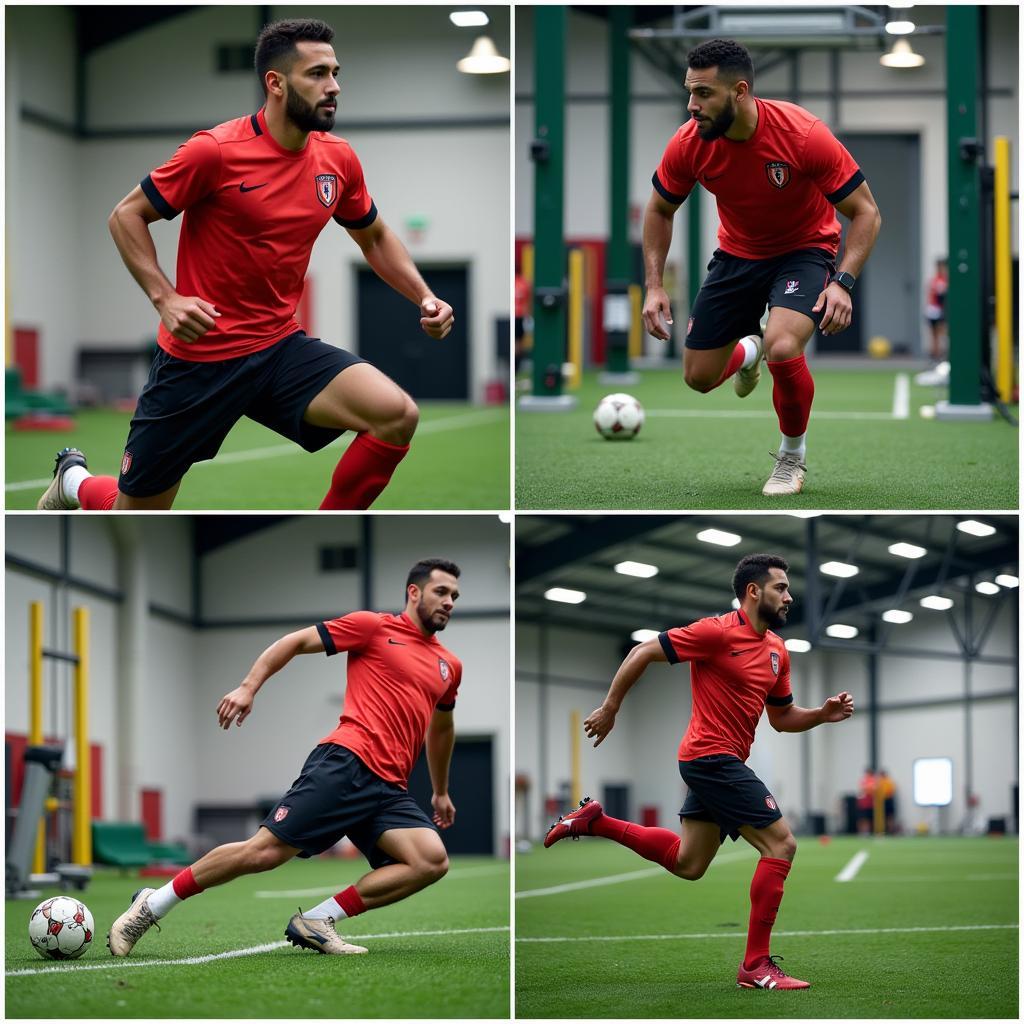How to Maintain Peak Football Performance
December 8, 2024Maintaining peak performance in football is crucial for success. It requires dedication both on and off the field, focusing on a combination of physical conditioning, tactical awareness, and mental fortitude. This article will explore the key strategies I’ve learned throughout my career, and how you can apply them to reach your full potential.
The Pillars of Peak Performance
Football is a demanding sport, requiring players to be at their physical and mental best. To maintain peak performance, you need to focus on three key areas: physical conditioning, nutrition and recovery, and mental strength.
Physical Conditioning: Building a Foundation for Success
 Footballer undergoing rigorous physical conditioning training
Footballer undergoing rigorous physical conditioning training
Physical conditioning is the cornerstone of any footballer’s success. It’s about building strength, speed, endurance, and agility. This requires a tailored training program that incorporates a variety of exercises. Think plyometrics for explosive power, weight training for strength, and interval sprints for speed and endurance. Don’t forget about flexibility and mobility work – crucial for injury prevention and optimal movement on the pitch.
Nutrition and Recovery: Fueling the Machine
What you put into your body is just as important as the work you put in on the training ground. A balanced diet rich in lean protein, complex carbohydrates, and healthy fats is essential for fueling performance and recovery. Hydration is equally critical; ensure you’re consuming enough water throughout the day, especially before, during, and after training. Finally, prioritize rest and recovery. Adequate sleep and active recovery techniques, like stretching and foam rolling, help your body repair and rebuild after intense training sessions.
Mental Strength: The Winning Edge
The mental game is often overlooked, but it’s just as important as physical prowess. Develop mental toughness through visualization techniques, mindfulness practices, and positive self-talk. Visualizing successful plays and maintaining a positive mindset, even during setbacks, can significantly impact your on-field performance. Learn to manage pressure and stay focused in high-stakes situations.
How to Optimize Your Training Routine for Peak Performance
Building a training regimen tailored to your specific needs is key. Consider working with a strength and conditioning coach to create a personalized program. This program should address your strengths and weaknesses, while also focusing on injury prevention. Regularly assess and adjust your training based on your progress and feedback from your coach.
Incorporating Recovery into Your Routine
Don’t neglect recovery! Adequate sleep is crucial for both physical and mental restoration. Aim for 7-9 hours of quality sleep each night. Active recovery, such as light jogging or yoga, can help reduce muscle soreness and improve flexibility.
Common Pitfalls to Avoid
Overtraining is a common mistake that can hinder your progress and increase your risk of injury. Listen to your body and take rest days when needed. Poor nutrition and inadequate hydration can also negatively impact your performance. Don’t underestimate the power of a balanced diet and proper hydration.
 Footballer drinking water and eating healthy food
Footballer drinking water and eating healthy food
Conclusion
Maintaining peak football performance requires a holistic approach that encompasses physical conditioning, nutrition and recovery, and mental strength. By focusing on these key areas and implementing the strategies outlined in this article, you can elevate your game and achieve your full potential on the pitch. Remember, consistency is key. Stay dedicated to your training, prioritize your well-being, and you’ll be well on your way to reaching your goals.
FAQ
- How many hours of sleep should a footballer get per night? Aim for 7-9 hours of quality sleep.
- What are some good sources of protein for footballers? Lean meats, fish, eggs, and beans are all excellent sources of protein.
- How can I improve my mental toughness? Visualization, mindfulness, and positive self-talk are effective techniques.
- What are some common signs of overtraining? Fatigue, decreased performance, and increased susceptibility to illness.
- How important is hydration for football performance? Crucial. Dehydration can lead to decreased performance and increased risk of injury.
- How can I create a personalized training plan? Consulting with a strength and conditioning coach is recommended.
- What are some good active recovery techniques? Light jogging, yoga, and stretching are all beneficial.
Common Scenarios
- Scenario 1: Feeling tired and sluggish during training. Consider adjusting your training volume and intensity. Ensure you’re getting enough sleep and proper nutrition.
- Scenario 2: Struggling with performance anxiety. Practice visualization and relaxation techniques. Focus on positive self-talk.
- Scenario 3: Experiencing recurring muscle soreness. Incorporate active recovery strategies like foam rolling and stretching. Ensure you’re staying hydrated.
Further Reading & Related Articles
Find more articles and tips on maintaining peak athletic performance on our website.
Contact Us
Need support? Contact us 24/7: Phone: 0396443476, Email: [email protected] or visit us at: 23 Thang 3, Dak Nia, Gia Nghia, Dak Nong, Vietnam.